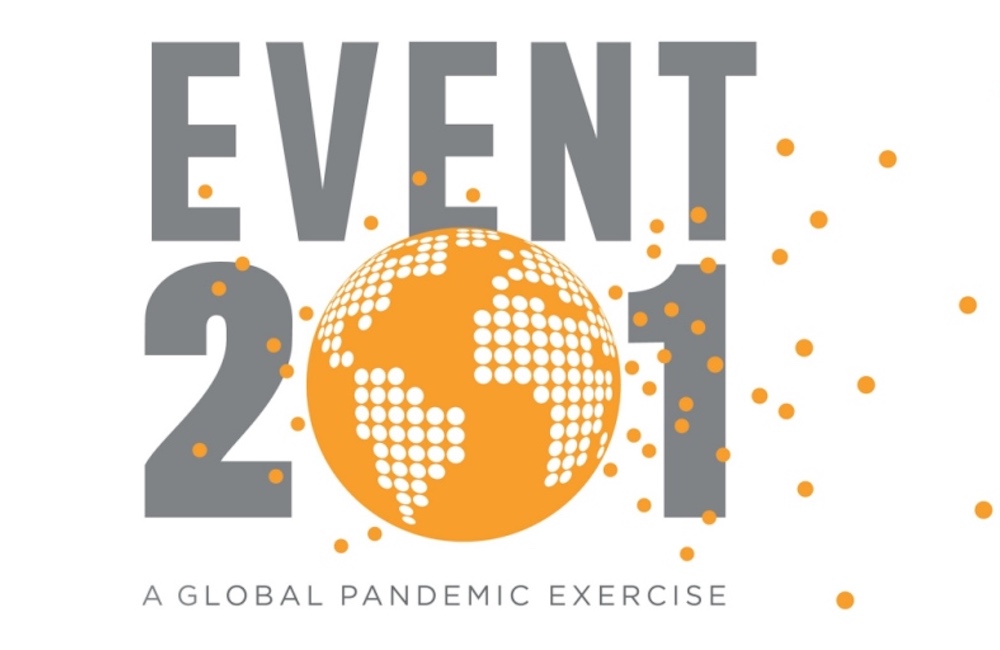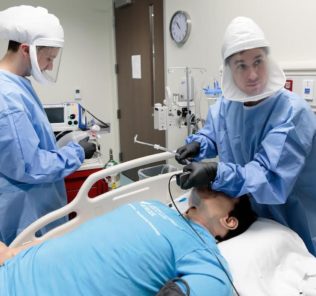Event 201: Pre-Pandemic Healthcare Simulation Exercise Predicted Some COVID-19 Outcomes
Even before the first cases of COVID-19 were diagnosed, the medical and scientific communities understood the importance of pandemic preparedness. With funding support from the Open Philanthropy Project, Johns Hopkins Center for Health Security developed in October of 2019 what is now known as “Event 201.” This project involved the creation of a 3.5-hour pandemic tabletop exercise that simulated a series of clinical simulation scenario discussions relating to the response to a hypothetical, but scientifically plausible, pandemic. Ultimately, the October 2019 healthcare simulation scenario vividly demonstrated a number of these important gaps in pandemic preparedness just as COVID-19 was about to explode.
(Editor’s Note: Learn why we think COVID-19 will help make healthcare simulation one of the most important industries in the world, especially after demonstrating the benefits of Event 201.)
Aiming to educate senior leaders at the highest level of U.S. and international governments and leaders in global industries, Event 201’s dramatic, scenario-based facilitated discussions confronted difficult, true-to-life dilemmas associated with such a pandemic. According to the scenario website, 15 global business, government, and public health leaders became players in the healthcare simulation exercise. Their participation helped to highlight unresolved real-world policy and economic issues that “could be solved with sufficient political will, financial investment, and attention now and in the future.”
Sponsored Content:
An invitation-only audience of nearly 130 scientists, researchers, and international leaders attended the exercises, which included pre-recorded news broadcasts, live “staff” briefings, and moderated discussions on specific topics. Developers carefully designed these issues in a compelling narrative that educated the participants and the audience. A livestream of the event is now available to everyone via the link below.
Event 201 Scenario Details
The Event 201 clinical simulation scenario is meant to simulate an outbreak of a “novel zoonotic coronavirus” transmitted from bats to pigs to people, that eventually becomes efficiently transmissible from person to person, leading to a severe pandemic. According to the scenario website, the pathogen and the disease it causes are modeled largely on SARS but is more transmissible in the community setting by people with mild symptoms.
As part of the scenario, the disease starts in pig farms in Brazil, and then starts to spread more rapidly in healthcare settings. When the virus starts to spread efficiently from person to person in the low-income, densely packed neighborhoods of some of the megacities in South America, the epidemic explodes.
Sponsored Content:
Next, the virus is exported by air travel to Portugal, the United States, and China and then to many other countries. The scenario shares that, although some countries are initially able to control the virus, the spread continues to be reintroduced, and eventually no country can maintain control. Further, there is no possibility of a vaccine being available in the first year, but there is a fictional antiviral drug that can help the sick but not significantly limit the spread of the disease.
At this point, since the whole human population is susceptible, during the initial months of the pandemic, the cumulative number of cases increases exponentially, doubling every week. As the cases and deaths accumulate, the economic and societal consequences become increasingly severe.
Developers had this scenario end at the 18-month point, with 65 million deaths. They shared that this is because the pandemic began to slow due to the decreasing number of susceptible people. They write that, “the pandemic will continue at some rate until there is an effective vaccine or until 80% to 90% of the global population has been exposed. From that point on, [the virus] is likely to be an endemic childhood disease.”
Event 201 Exercise Recommendations
From the Event 201 scenario experience, team members concluded that “there are major unmet global vulnerabilities and international system challenges posed by pandemics that will require new robust forms of public-private cooperation to address.” Per the Johns Hopkins Center for Health Security, World Economic Forum, and Bill & Melinda Gates Foundation, the following recommendations were jointly proposed.
- Governments, international organizations, and businesses should plan now for how essential corporate capabilities will be utilized during a large-scale pandemic.
- Industry, national governments, and international organizations should work together to enhance internationally-held stockpiles of medical countermeasures (MCMs) to enable rapid and equitable distribution during a severe pandemic.
- Countries, international organizations, and global transportation companies should work together to maintain travel and trade during severe pandemics.
- Governments should provide more resources and support for the development and surge manufacturing of vaccines, therapeutics, and diagnostics that will be needed during a severe pandemic.
- Global businesses should recognize the economic burden of pandemics and fight for stronger preparedness.
- International organizations should prioritize reducing the economic impacts of epidemics and pandemics.
- Governments and the private sector should assign a greater priority to developing methods to combat mis- and disinformation prior to the next pandemic response.
Event 201 scenario researchers understand that accomplishing the above goals will require collaboration among governments, international organizations and global businesses. However, they believe that if these recommendations are robustly pursued, major progress can be made to diminish the potential impact and consequences of future pandemics. Thus, those involved in this project call on leaders in global business, international organizations, and national governments to launch an ambitious effort to work together to build a world better prepared for the next severe pandemic.
Learn More About the Event 201 Scenario
Event 201 Exercise Team: Eric Toner, MD, was the exercise team lead from the Johns Hopkins Center for Health Security. Crystal Watson, DrPH, MPH and Tara Kirk Sell, PhD, MA were co-leads from the Johns Hopkins Center for Health Security. Ryan Morhard, JD, was the exercise lead from the World Economic Forum, and Jeffrey French was the exercise lead for the Bill and Melinda Gates Foundation.
Exercise team members were Tom Inglesby, MD; Anita Cicero, JD; Randy Larsen, USAF (retired); Caitlin Rivers, PhD, MPH; Diane Meyer, RN, MPH; Matthew Shearer, MPH; Matthew Watson; Richard Bruns, PhD; Jackie Fox; Andrea Lapp; Margaret Miller; Carol Miller; and Julia Cizek.
Lance Baily, BA, EMT-B, is the Founder / CEO of HealthySimulation.com, which he started in 2010 while serving as the Director of the Nevada System of Higher Education’s Clinical Simulation Center of Las Vegas. Lance also founded SimGHOSTS.org, the world’s only non-profit organization dedicated to supporting professionals operating healthcare simulation technologies. His co-edited Book: “Comprehensive Healthcare Simulation: Operations, Technology, and Innovative Practice” is cited as a key source for professional certification in the industry. Lance’s background also includes serving as a Simulation Technology Specialist for the LA Community College District, EMS fire fighting, Hollywood movie production, rescue diving, and global travel. He and his wife live with their two brilliant daughters and one crazy dachshund in Las Vegas, Nevada.
Sponsored Content:
















